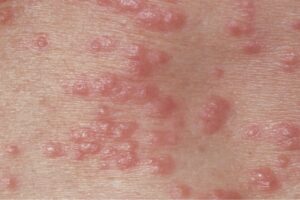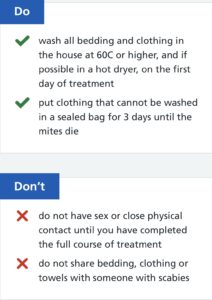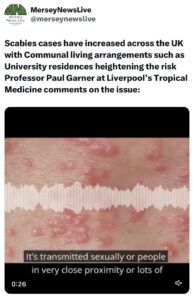
Merseyside students have been warned that scabies cases are on the rise.
The disease is particularly prevalent in communal living areas such as university accommodation and house shares, where transmission has been heightened.
According to NHS figures, the number of individuals diagnosed with highly infectious skin infections in hospitals surged to 3,689 in the year leading up to April, marking an increase of more than 70% from the 2,128 cases reported in the previous year. The rise has increased the growing concern over the spread of scabies and other skin infections. Doctors are currently urging people to seek treatment and not ignore their symptoms.
What is Scabies and what are the types of symptoms to look for?
Scabies is an itchy rash/ raised red sports caused by mites that spread across your body through direct skin-to-skin contact with individuals who are already infected with the skin disease. An individual will experience severe discomfort and skin irritation which will spread across the whole body. It can often affect areas including, the under the arms, waist, groin, wrists, in between the fingers and the bottom.
These symptoms can occur over several weeks and can take up to eight weeks to appear. Indirect contact can also present itself through sharing items of clothing, and bedding. Whist symptoms might not be severe, you should still seek medical treatment to prevent any further infectious transmission.
Students are being advised to seek treatment or advise from their local GP or pharmacy if they start to display these symptoms. Those who live in halls of residence with other students should notify their GP to if they share facilities such as shared bathroom, kitchen, living space etc.

Professor Paul Garner from the Liverpool School of Tropical Medicine said: “If you want to treat scabies, there is a drug called Ivermectin, which you can take orally. And then there’s a Permethrin cream that you might use.
“Many people evaluate whether one’s better than the other by randomised controlled trials where you allocate people to one treatment or the other and see which one gets the best cures.
“For me, it was with children in Papua New Guinea. I was always picking up children and carrying them around and they were always covered in scabies. And that’s that’s how I think I got it. It was an awful experience, I was continuously itching at the rashes it caused. It’s very common in close contact areas and within poor areas with poor sanitation”.










